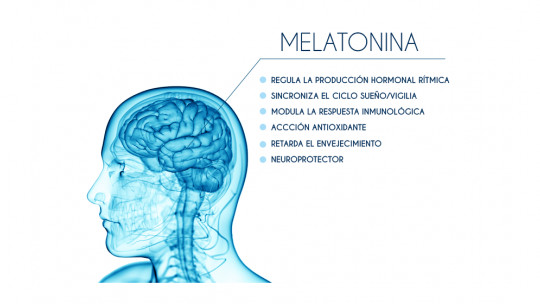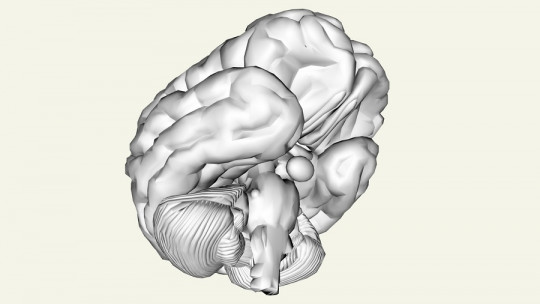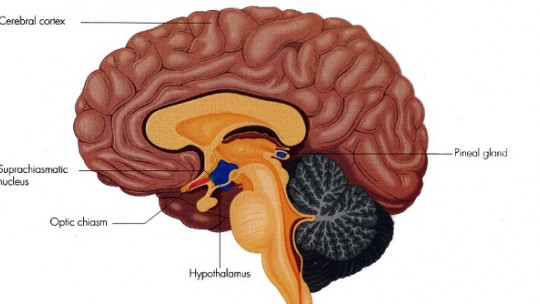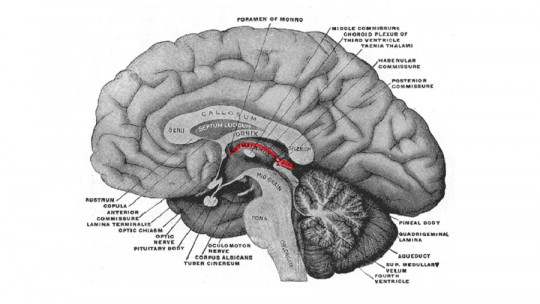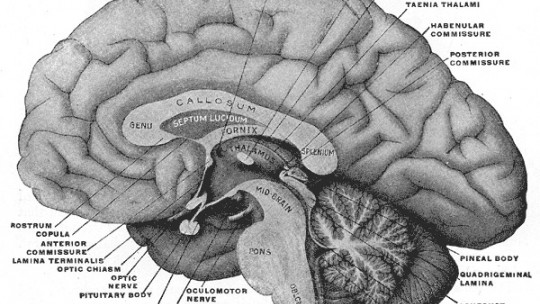It is a fact known to everyone that human beings, like other animals, need sleep Sleep is a basic physiological function, a mechanism that allows the body (and especially the brain) to rest and repair itself. However, sleep is not a single and invariable process, but rather goes through different phases throughout the process. Furthermore, it is a process that is not voluntary, but depends on circadian rhythms.
These rhythms regulate the sleep-wake cycle according to the biological needs of the body and the time of day. This regulation, as well as the seasonal patterns that occur in other animals, are mainly due to the action of a hormone: melatonin
Melatonin: what are we talking about?
Melatonin is a hormone secreted mainly by the epiphysis or pineal gland from tryptophan and serotonin. It is a very fat-soluble hormone, with great ease in penetrating the blood-brain barrier and inside the cells. This hormone is generated when the retina perceives the absence of light, with the maximum peak of this hormone occurring at night and reducing in the presence of light.
The melatonin production process is as follows: the retina captures the presence or absence of light, passing this information to the optic nerve, subsequently to the suprachiasmatic nucleus and from there to the superior cervical ganglion, which reaches the epiphysis. This proceeds to carry out a series of reactions that culminate in the production of melatonin, which is distributed throughout the rest of the body. Apart from its birth in the brain, it also appears in the retina, liver, kidneys, intestine, immune cells and in the female endometrium.
Melatonin receptors
Melatonin has its receptors in various parts of the body , both inside and outside the brain, which produce different effects on the functioning of the body. Brain melatonin receptors have an effect on circadian rhythms, non-neural receptors influence reproduction, and finally peripheral receptors have different effects depending on their location.
In this way, the functions of melatonin are many and varied, affecting various systems of the body, although The function for which it is best known and studied is the control of circadian rhythms , mainly carrying out a chronobiological action in the suprachiasmatic nucleus. That is, this hormone helps establish when we go from sleep to wakefulness and vice versa. Maximum production usually occurs specifically around an hour and a half after falling asleep, helping to induce deep sleep.
Effects beyond sleep
Aside from its function of regulating the sleep-wake cycle, recent research has shown that this hormone has great utility in numerous systems. It actively participates in the regulation of seasonal and reproductive phenomena, such as heat in animals. It also affects long-term memory enhancement
The immune system is also affected by this hormone (reducing its efficiency during its absence) and having an important antioxidant effect that counteracts excess free radicals. Thus, this hormone also participates in the growth and aging processes.
Use of melatonin exogenously
Despite being an endogenous hormone, manufactured by the body itself, Melatonin has been artificially synthesized and marketed as dietary supplement (although it is not yet allowed as a medicine due to the little existing research and the inconclusive results obtained so far).
Some of the uses that have been given are the following:
1. Sleep disorders
Melatonin has been used as a treatment for sleep disorders Specifically, it highlights its ability to improve sleep adjustment in cases of jet lag, demonstrating that administered around bedtime at the destination point, jet lag decreases considerably. That is why it is widely used in circadian rhythm disorders. It also produces benefits against delayed sleep phase syndrome, as well as sleep disorders in the case of individuals who work late at night.
However, regarding insomnia primary or secondary to another disorder, although Yes, it has been shown to reduce sleep latency and improve the amount of time asleep in some studies it has not shown a greater effect than placebo, with the use of benzodiazepines being more effective and sleep hygiene always being prioritized.
Some research shows that the administration of this substance produces improvement in other disorders due to improvement in sleep patterns, examples being cases of autism or childhood epilepsy. However, further research would be required in this regard.
2. Action on reproduction and growth
It has been observed that the administration of melatonin is linked not only to sleep patterns, but also to other seasonal processes.
In animals, It has been proven that it affects and modulates periods of heat In humans, it has been observed that the administration of this hormone affects growth, making it evident that it has an effect on the onset of puberty. An excess of this hormone can delay it, while a deficiency can cause it to advance.
3. Headaches
The research carried out indicates that Melatonin supplementation can act preventively to avoid migraines
4. Mood disorders
Different studies have demonstrated the effectiveness of applying melatonin to improve the condition of patients with depressive disorders, especially in the case of seasonal affective disorder.
5. Aging and dementia
Melatonin production is not constant throughout life producing a significant and progressive decrease from adolescence to the end of life (which helps explain why the elderly have shorter and more frequent periods of sleep).
Furthermore, a large part of the effects of aging are due to the presence of free radicals. Likewise, different types of free radicals and oxidation have also been linked to dementia processes such as Alzheimer’s or Parkinson’s.
Given that it has been shown that melatonin is one of the greatest endogenous antioxidants that we have, various tests have been carried out that have shown that the administration of melatonin reduces oxidative damage in the different systems of the body, thereby It may help delay brain aging and prolong intellectual functionality in dementia cases.
6. Cancer
The application of melatonin in some cancer patients seems to reduce tumor growth and prolong survival, being observed as a possible treatment to be combined with chemotherapy. This effect appears to be due to antiproliferative properties and the potentiation of the effects of chemotherapy, especially in cases of cancers that depend on reproductive cells.
7. Other inconclusive investigations
As mentioned, Melatonin has certain effects on the immune system, acting as a modulator In addition to being a powerful antioxidant, it has been discovered that it acts on receptors on T lymphocytes, contributing to the production of immunoglobulin.
The possibility that it contributes to slowing the replication of HIV has been studied, so that it could be applied as a reinforcing treatment. Its usefulness has also been explored in cases of different cancers. However, the results are not conclusive.

